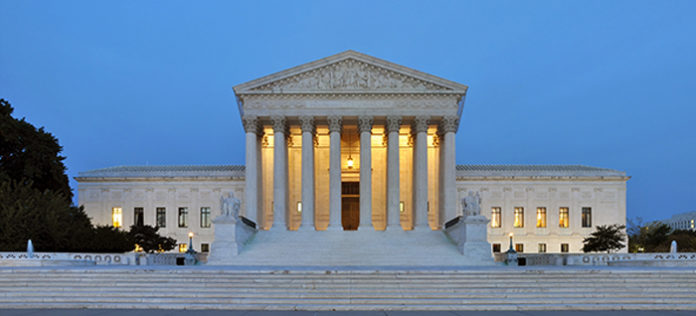
The U.S. Supreme Court announced April 13 the justices would hear 10 upcoming cases scheduled for oral argument by phone in May. The tele-docket includes one case from Colorado over the freedom of presidential electors, another from Washington, and three over President Donald Trump’s tax returns (two of those cases have been consolidated).
The arguments will include access the court has not previously opened: live audio streaming. An announcement from the court says it will be available to media, but as of April 16, the court hadn’t provided further details.
The court’s decision to provide live audio streaming puts an elephant in the room: Will it continue that practice after government requirements for social distancing have subsided and the court holds in-person arguments again?
Digital access to the Supreme Court’s oral arguments has been a sticking point of disagreement between open court advocates and some members of the court themselves. Currently, the court posts transcripts of arguments the same day they take place and audio of the week’s arguments each Friday.
But advocates for public access to courts have long said that’s not enough. Melissa Wasser, a policy analyst for the Reporters Committee for Freedom of the Press, said expanded public access to oral arguments digitally increases the public’s ability to hold their government accountable. RCFP is a pro bono legal services organization.
“There are Supreme Court justices on the bench who were nominated by the current president, and the current president is up for reelection,” she said. “And if there’s something that the public doesn’t like, or that the public agrees with, that could sway a vote one way or the other based on the courts.”
RCFP has advocated for several years for the Supreme Court to make audio available more quickly after arguments take place. The court occasionally provides access to recordings the same day of arguments in high-profile cases, but has not granted requests for live audio and visual broadcasts. In fall 2019, RCFP along with a coalition of news organizations requested live streams of several cases including cases over DACA and Title VII’s protection of sexual orientation and gender identity.
The court’s decision to go forward with oral arguments in the next few weeks is notable. Arguments are just the tip of the iceberg in any case, and the justices can (and do) decide cases without them.
Given the public interest in deciding the tax and presidential elector cases before the 2020 election, it’s feasible to have predicted the Supreme Court would decide them without arguments.
But public interest has weight in the argument for holding arguments. The two “faithless elector” cases deal with whether states can enforce laws that require presidential electors to vote for the candidate who wins their state’s national popular vote, so they weigh directly on how the November general election will be conducted. And some voters may consider the outcome of cases over the release of Trump’s tax returns relevant to their voting decisions.
Wasser said public interest in the cases’ outcomes probably pushed the court to find a way to have oral arguments remotely instead of issuing rulings without them or delaying arguments until the court decides to hold arguments in person again.
“With the election coming up in November, kicking the can down the road until the fall I don’t think was feasible for them,” she said. “The term starts in October, a month before a national election that has really great implications for the country.”
Justices have offered their views before live audio and video streaming of oral arguments.
Reasons some have given opposing it tend to run along the theme that providing live footage of arguments could damage the integrity of the court, be it from news media stripping away nuance from arguments by just using the most interesting sound bytes or from lawyers showboating during arguments if they are broadcast.
But many lower circuit courts and state appellate courts have taken up the practice of making audio and video of their oral arguments available live or the same day. Colorado’s Court of Appeals and Supreme Court stream live video of arguments and post the footage of each session online the same day.
Chris Jackson, a partner at Holland & Hart, said lower courts’ public access to oral arguments probably makes the best case for the Supreme Court to permanently expand digital access as well.
“That is, I think, the best argument to allay the concerns of the Supreme Court,” he said. “The circuit courts are allowed to decide for themselves what they want to do. And many of them have done that, and there doesn’t seem to be much of a problem with it.”
SCOTUS Blog has reported that although a few circuit and state courts have had technical hiccups doing oral arguments remotely this spring, the chief judge of Texas’s Supreme Court has said overall they have gone well.
Jackson said he believes the Supreme Court will have a hard time reverting to its established practices for providing argument audio on a delayed timeframe. Once the courts allow live streaming, he said, that makes reasoning against it about logistics or court tradition less persuasive.
“Once the genie is out of the bottle, it’s hard to then say we need to go back,” Jackson said. “Those arguments seem less persuasive if they do it and no major issue comes up out of this.”
Wasser said she’s “cautiously optimistic” about the implications of the court’s decision to hold oral arguments in its imminent cases and provide live streaming for now. “If the streaming is done correctly and we can show that the sky didn’t fall and that the court can still be this historical institution that still completely functions as normal,” she said, “I think it’s more likely that they will then continue to do this.”
—Julia Cardi

